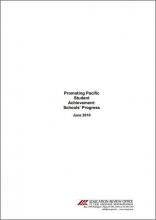- Topics: Assessment, Group Special Education (GSE)
- Published: 24 Apr 2018
Evaluation at a glance: A decade of assessment in New Zealand Primary Schools - Practice and trends
High quality assessment and evaluation allows us to focus on student progress and outcomes at classroom, school and system levels. It helps teachers, schools and systems to report on student achievement across points in time, and provide information for parents, trustees and the public about the quality of education.
- Published: 10 Jul 2013
Including Students with High Needs Primary Schools
This ERO evaluation reports on primary schools' progress in relation to the Government's Success for All policy. Success for All is about getting all schools to demonstrate inclusive practice for students with special needs.
- Published: 30 Jun 2010
Including Students with High Needs
ERO evaluated how well schools included students with high needs. Approximately three percent of the student population have significant physical, sensory, neurological, psychiatric, behavioural or intellectual impairment. ERO’s evaluation showed that approximately half of the schools in the study demonstrated inclusive practice, while 30 percent had ‘pockets of inclusive practice’ and 20 percent had few inclusive practices.
- Published: 01 Jun 2010
Promoting Pacific Student Achievement
This 2010 report is the second the Education Review Office has published on the educational achievement of Pacific students in New Zealand schools. The evaluation looked at the achievement, engagement and presence in school of Pacific students, and progress made in the three years since the previous report.
- Published: 01 Nov 2007
The Quality of Assessment in Early Childhood Education
Assessment informs an early childhood service’s programme and educators’ teaching practices. ERO evaluated the quality of assessment in all the early childhood services reviewed in Terms 3 and 4, 2006.
Services were at varying stages in their understanding and implementation of assessment practices, as not all had yet participated in professional development.
- Published: 01 Jun 2007
The Collection and Use of Assessment Information: Good Practice in Secondary Schools
ERO evaluated the collection and use of assessment information in schools in 2006. The evaluation concluded that more work can be done to improve assessment practice in schools. This complementary report aims to help secondary schools review their assessment practice. It highlights characteristics common to high quality assessment practices and includes examples of good practice.
- Published: 01 Jun 2007
The Collection and Use of Assessment Information: Good Practice in Primary Schools
ERO evaluated the collection and use of assessment information in schools in 2006. The evaluation concluded that more work can be done to improve assessment practice in schools. This report builds on this finding by giving examples of good practice in the collection and use of assessment information in primary schools. The report also includes three detailed case studies.
- Published: 01 Mar 2007
The Collection and Use of Assessment Information in Schools
Knowing what students know and can do is fundamental to effective teaching and students’ learning. Teachers need to assess student achievement to know whether or not their teaching is meeting the learning needs of their students.
In 2006, ERO evaluated how effectively schools collected and used assessment information. This report details the findings of that evaluation and recommends what can be done to make assessment practices in schools more effective.








